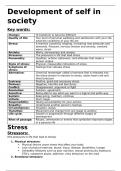Development of self in
society
Key words:
Change: To transform or become different
Quality of life: Your level of personal wellbeing and satisfaction with your life;
what the conditions of your life are
Stress: A reaction caused by ongoing, increasing new pressures and
demands. Pressure, nervous tension and anxiety, constant
worry, strain
Anxiety: Worry, nervousness and unease
Stressors: The pressures in life that lead stress
Personality: Qualities, actions, behaviour, and attitudes that make a
person unique
Signs of stress: Physical, measurable indications of stress
Symptoms of Feelings that indicate stress
stress:
Adrenaline: Chemical messenger called a hormone that is released into
the blood stream in reaction to stress, raises heart rate and
blood pressure
Eustress: Positive, good and necessary stress
Distress: Negative, harmful and bad stress
Conflict: Disagreement, argument or fight
Resolution: Solution, agreement
Assertive: Being able to say what you want in a logical and polite way
Sustain: Keep going, maintain, continue
Initiate: Start, begin
Responsibility: Taking accountability for your actions
Empathy: Understand another person’s feelings
Circumstances: Situation, status
Transition: Movement and change from one stage to another
Life cycle: Growth or progression through different stages of
development
Rites of passage: Rituals, ceremonies or events that symbolise important stages
in a persons life
Stress
Stressors:
(the pressures in life that lead to stress)
1. Physical stressors:
Physical factors cause stress that affect your body
Lack of physical exercise, abuse, injury, disease, disabilities, hunger
Unhealthy lifestyles such as poor nutrition, sexual promiscuity leading to
STD’s, substance abuse, addiction, risky behaviour on the road
2. Emotional stressors:
, Feelings and thoughts constant worry, nervousness, jealousy, anger,
rejection, fear of failure
Reactions to life crisis unplanned pregnancy, death of family member,
failing, divorce, being a victim of crime, not getting accepted into
university
Change moving away, starting a new job, marriage, transition from
school to adult life
Personality your personality may be a stressor
Type A Type B Type C Type D
-Competitive -Easy going and laid -Shy and non- -Pessimist
-Goal-orientated back assertive (negative)
-Like to be in -Delay tasks to last -Enjoy solitude -Expect the worst
control minute -People pleaser 24/7
-Brave (leads to -Procrastinator -Rather suffer than -Causes stress
new ideas (stressor) cause arguments -Keep feelings to
developed) -Not competitive (stressor) yourself
-Feel like -Optimistic -Interested in small -Like routine/ hate
everything is -Joke around and details change
urgent cool -Enjoy facts and -Minimal energy
-Busy and order -Easily irritated,
aggressive -Logical and careful depressed, sad
-Hardworking and thinking
self motivated
3. Social stressors:
Aspects in your relationships with others
Family divorce, death, poverty, gender discrimination, arguments,
pressure to succeed, stigma , lack of work
Friends and peers peer pressure, break ups, bullying, loneliness,
unpopularity, being pressured to wear nice clothes and partake in
substance abuse
4. Environmental stressors:
Physical factors in your environment that cause stress
Pollution, natural disasters, dangerous residence environments
Harmful living conditions, lack of privacy, noise pollution
Assessing stress levels:
Signs of stress: the physical and measurable indications of stress
-High temperature, diarrhoea, rapid heartbeat, bleeding
Symptoms of stress: feelings that indicate stress
-Worry, shivering, unable to sleep, constant thirst
Positive stress (eustress):
This stress motivates, encourages and pushes you to make good decisions
Releases adrenalin to give you energy to take action
You are able to cope with this stress
Writing an exam, presenting speeches, interviews
Negative stress (distress):
, Harmful and dangerous stress
Releases too much adrenaline
Unable to cope with this form of stress
Affects your performance and quality of life (often start abusing substances to
cope)
Levels of stress:
Low level: you are able to cope with the stress
Average level: coping, you need to pay attention to your stressors before they
become unmanageable
High level: not coping, urgently need to apply stress management methods to your
life
Stress management:
Coping mechanisms:
(the way that you act, behave and think to help you deal with stress)
Management techniques (p11-13):
(the ways that you control the stress in your life, methods you use to prevent stress)
1) Identify stressors and assess stress levels
2) Follow a balanced lifestyle
3) Make time for physical exercise, recreation and relaxation
4) Balanced nutrition
5) Deal with your emotions
6) Visualise and turn hurtful emotions into healing emotions
7) Laughter
8) Time management
9) Good relationships
10) Embrace changes
11) Apply exam stress reducers (calming exercises and breathing)
Conflict resolution
Interpersonal and intrapersonal conflict:
Interpersonal: conflict between two or more people
Intrapersonal: conflict within yourself (inner conflict)
Conflict resolution skills:
1. Map out the conflict
2. Use “I” sentences I feel… ; When… ; Because… ; And I would like…
3. Be assertive
4. Listen and rephrase
5. Self-control to prevent and resolve conflicts
6. Negotiate and meditate
Negative conflict resolution:
Conflict avoidance: this can involve withdrawing entirely from the conflict or
refusing to discuss it. It could also be changing the topic or just making peace





